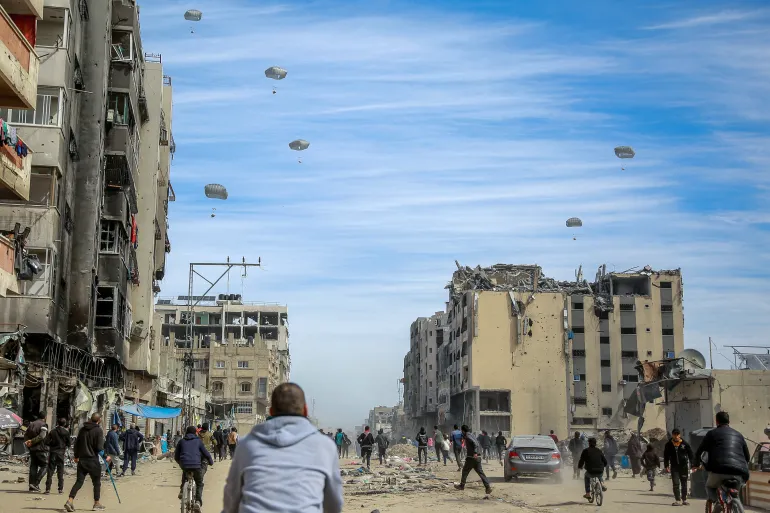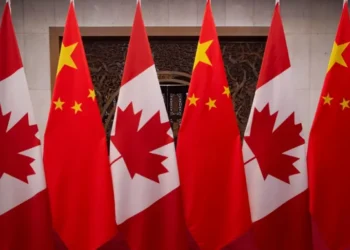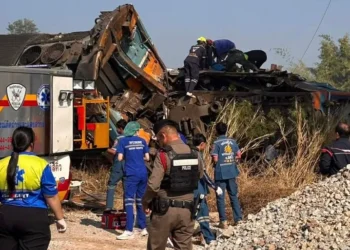Airdrops may seem like a swift and efficient way to deliver aid to the besieged enclave of Gaza.
However, the reality on the ground paints a much darker picture; one of unnecessary risks and avoidable tragedies.
While the gesture is undoubtedly well-intentioned, it cannot be divorced from the reality of its consequences.
The loss of life resulting from these drops, whether due to drowning, stampedes, or malfunctioning parachutes, cannot be ignored, giving way to questions about the necessity and practicality of such deliveries.
As Palestinians risk their lives swimming into the Mediterranean Sea to retrieve parcels of aid, one can not help but wonder, “Is this flashy display of humanitarianism truly serving its purpose, or is it merely exacerbating an already dire situation?”

Reports of Palestinians drowning while attempting to retrieve airdropped supplies underscore the desperate circumstances faced by many in the region.
At least seven Palestinians have drowned after they swam into the Mediterranean Sea trying to get aid that was airdropped there citing Gaza’s Health Ministry.
At least five other people are missing in the waters off Gaza. They were among hundreds of people who swam into the sea near as-Sudaniya northwest of Gaza City after parcels of aid were airdropped there.
“Why can’t those who deliver aid deliver it through the crossings?” Muhammad Sobeih, one Gaza resident who went into the sea to get aid, lamented.
“The crossings are safer and easier,” he added.
First and foremost, this tragedy highlights the acute desperation of the Palestinian people, who are forced to resort to perilous measures in order to access basic necessities such as food, medicine, and other essential supplies. The fact that individuals felt compelled to risk their lives in pursuit of aid speaks volumes about the dire situation on the ground
Earlier this month, at least five Palestinians were killed in northern Gaza when an airdropped aid package fell on them after its parachute failed to open, fuelling more criticism of the aid delivery method.
The government media office in Gaza lambasted the “useless” airdrops as “flashy propaganda rather than a humanitarian service” and calling for food to be allowed through land crossings.
The United States will continue supplying humanitarian relief from the air into the Gaza Strip, the White House has said, despite Palestinians dying – by drowning, stampedes and falling aid boxes – while trying to reach the aid.
“Airdrops are one of the many ways that we are helping to provide desperately needed aid to Palestinians in Gaza, and we will continue to do so,” a spokesperson for the National Security Council told reporters,
The continued insistence on airdrops in the face of such tragedies raises ethical questions about the prioritization of optics over efficacy and the potential disregard for human life.
While airdrops may be well-intentioned, they clearly lack the precision and safety measures necessary to ensure that aid reaches those in need without endangering lives.
Only through the opening of crossings can we ensure that aid reaches its intended recipients without further loss of life.
A UN humanitarian office spokesperson has called for Israel to revoke a decision barring food deliveries to northern Gaza from the UN Palestinian refugee agency (UNRWA), saying people there were facing a “cruel death by famine”.
“The decision must be revoked,” OCHA spokesperson Jens Laerke told a UN briefing.
“You cannot claim to adhere to these international provisions of law when you block UNRWA food convoys.”
Israel, which has occupied the West Bank and East Jerusalem since 1967, has accused Unrwa of collaborating with Hamas in Gaza – a charge Unrwa has denied.
UNRWA’s head said on Sunday that Israel had informed the UN that it will no longer approve its food convoys to north Gaza.
Yesterday, Israeli government spokesperson David Mencer said “Unrwa are part of the problem, and we will now stop working with them. We are actively phasing out the use of Unrwa because they perpetuate the conflict rather than try and alleviate the conflict.”
READ ALSO: Gershkovich, A Pawn To Achieve Kremlin’s Political Ends























